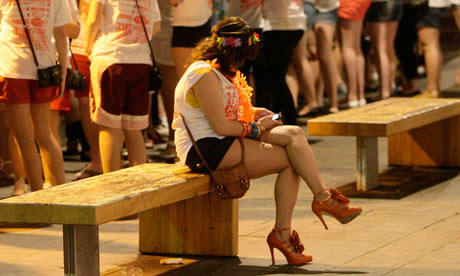
There's a big thing around peer pressure when it comes to young people and sex. Many feel they should be having sex. They all expect the average age that people lose their virginity is 14 – many are shocked to hear it is actually 16 and three-quarters. It is the one thing that stands out working in the Sharp (Sexual Health Action: Real People) team in Bristol.
That's why it's so important for them to have support on sexual health from our team – made up of other young people. I got involved with the Sharp team after expressing an interest in volunteer work at my youth group. I decided to go for it because there's a lot of stigma around sex and sexual health, and people can live much healthier lives without it.
We run events for young people, geared up to be fun but serious as well. We also do a bit of outreach at underage club nights in the city; we'll have stalls so people can come up and ask us questions.
For the first time this month we've got a space in the city centre where we're putting up a huge marquee where people can come and ask us questions. This time, we're aiming to reach parents too – we want to de-stigmatise those awkward conversations parents and children have about sex.
It's natural that people get embarrassed when they talk about sex openly. After a while I became good at sussing out when I could prompt them to talk a bit more, and when not to pry because they didn't want to talk.
Young people feel more comfortable talking to other young people about sex, as we're more liberal. They are more likely to be receptive. When sex education comes up in schools, everyone just giggles and never takes it seriously. They expect a teacher to be patronising and think: "What's a 40-year-old going to know about sex?" Teenagers don't like listening to adults anyway! Just talking to another young person is so much better, and hopefully it can ultimately lead to things like fewer teenage pregnancies.
Why am I involved in Sharp? It makes me happy to know that I've helped someone and they've learned something. If I can help de-stigmatise sex for young people then I'm happy. A lot of language gets bandied about among teenagers, like "slut" and other words, and it's unnecessary. I'm quite confident in speaking about sensitive issues, and am happy to go out there and say what needs to be said. But I am aware that bringing up sex around people, you don't want to make the wrong impression sometimes.
The Sharp team is provided and managed by the Terrence Higgins Trust. It is commissioned by NHS Bristol who work in partnership with Terrence Higgins Trust to ensure that young people are involved in the design and delivery of sexual health services in Bristol. There's 10 of us in the team – we call ourselves the Sharpies. In just a year, we've gone from operating on our own, to working with local youth groups.
My friends know about the work I do – but it's OK as I've bullied them into my liberal way of thinking. I started getting involved with the project when I started college, and at that age people are mature about that sort of thing; no one was really surprised I was doing volunteering work. But when I first started talking about Sharp, they did sometimes go a bit quiet and embarrassed. Now, some of them come to me when they want to talk about a sexual health issue that they're worried about. My family are cool about it too.
• This article was amended on 28 August 2012. It originally said that Sharp is set up and funded by the Terrence Higgins Trust. The Sharp team actually is provided and managed by Terrence Higgins Trust, but is commissioned and funded by NHS Bristol.

